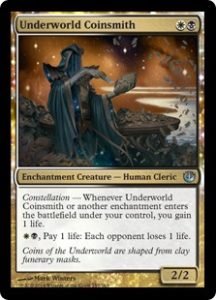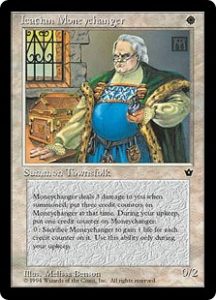Money. It is a terribly complicated and overwhelmingly difficult concept to approach, regardless of the context in which we put it. Moreover, when we talk about our financial obligations to our children, the conversation becomes even more difficult. Throw on top of that a game which is completely a hobby, with relatively little social value and an unending pit of potential purchases… Well, you pretty much have the least desirable discussion EVER. So let’s have it.
Why spend any money on Magic the Gathering? That’s a great question. Some would argue that there is no reason. It is pointless and only bad things come from this work of the devil. Ok, that’s a valid point. Sure, the “Devil” may have had his “hands” involved in creating “magic” but clearly this is too weird of a conversation for “normal people” to even have. (Make sure you do the little quote thingy with your fingers while reading that sentence…It adds to the dramatic value.)
But really, there are a number of valid reasons why a financial investment into MTG is ok. First, your child may genuinely be interested in playing games with other people and specifically, playing a game which is always evolving. In MTG new sets of cards are added to the world every few months, so there is always a revitalization involved in the culture and dynamic of the game. This is an important element of MTG that sets it apart from board games or other card games, for example. If your child is interested in something, it’s probably a good idea to at least entertain it, drop some bills, and see what it’s all about.

“If your child is interested in something, it’s probably a good idea to at least entertain it, drop some bills, and see what it’s all about.”
Second, “Magic cards” (as they are referred to by most) can quickly grow (and therefore shrink) in value. A $4 pack of cards can lead to a $300 profit. Likewise, a $40 card you decided to buy, could be worth $15 a few weeks later. So, MTG is sort of like gambling with the added bonus of playing a really cool game. Or, it’s a game that you play with the added bonus of making money.
Finally, depending on the type of person you are, and what your interests are, it could very quickly become a way for you and your child to bond. If that means spending some money, well… so be it.
You probably came to these profound revelations on your own and I am merely reiterating… But, I would like to get deeper into the part where you commit to spending money without going broke. This is important. I say without growing broke, but in reality, I really mean: How do we allocate funds which are not meant for leisure to something that seems completely leisurely. And this is where we take a hard look at what Magic the Gathering is, fundamentally. It is a game. It is a community. It is an opportunity. The part about it being good or bad are merely conjecture. As a parent, I have tried to evaluate what MTG is and how it relates to other “hobbies and activities” we encourage our kids to participate in. And, while it may not be a sport or a music program, where the physical body is moving, or all aspects of the brain are functioning, I do believe it should fall into the realm of extra-curricular activities. I say this because MTG is something that a child can do regularly, engage with other humans, learn and grow from, feel pain and loss from, triumph and succeed, and inevitably either integrate into their adult life or let go of. The same could be said of most hobbies and activities. Music lessons, sports programs, they all cost money. So the big question is, how can MTG look as affordable (or unaffordable) as soccer?
In Charlottesville, VA, where I reside, 5-8 weeks of basketball, soccer or flag football can cost anywhere from $60-$125. This includes a t-shirt. No matter how you slice and dice it, it’s basically the same as spending $13/wk at your local game store to do a booster draft. If you remember playing sports as a kid, you will remember, buying helmets, gloves, pants, and whatnot. So buy a booster box or a fat pack or a playmat or some dice. It’s basically the same thing. Some kids learn this way. They learn through words and images, deduction and intellectual stimulation. Some kids learn with their body. Instruments cost hundreds or possibly thousands of dollars, and lessons can range from $20-$60 / hour. Granted playing an instrument can be a critical developmental resource for the vast majority of humans, MTG can actually be more affordable and interesting for your child.
Ultimate recommendation: Be open to the idea that Magic: The Gathering may not be as expensive as it seems. Set routine opportunities for your child to play. Refer to my previous articles for more advice on Frequency of playing MTG. Budget a regularly weekly expense for magic as if it were an extra-curricular activity and be strong, padawan.

Budget a regularly weekly expense for magic as if it were an extra-curricular activity and be strong, padawan.
Moving along. As if money wasn’t already a difficult enough conversation to have, I would like to discuss something which irks me about MTG and which I believe it is the responsibility of those who care to help change. Of course, many kids get involved in MTG, whether at 13 or 18, they are still kids. And their parents help to fund their interest in the game. But since the game is so complicated, many parents remove themselves from the intricacies. As long as your child isn’t hurting anyone, it’s probably ok. Unfortunately, this mentality contributes to the complacency that has created a culture which objectifies the female body, unintentionally alienates females from playing and which ultimately goes on to raise young men whose insecurities can get the better of them.
This is more of a call to action than a reason to avoid MTG. I believe that once an individual gets into the gameplay, the majority of images become irrelevant. That is to say that most images are overlooked and matter little to the impact a card has on winning or losing. However, it seems that so many cards which display a female archetype, do so in a way which is derogatory, and thus, perpetuate the exploitation of the female body. For example: [casthaven]Visara the dreadful[/casthaven], [casthaven]Sisters of Stone Death[/casthaven], and [casthaven]Razia, Boros Archangel[/casthaven]. Now, I understand that these legendary female creatures have the bodies they have. But if you look at the clothes they are wearing, it is obvious that their violence is sexualized. This is the type of imagery that is unnecessary, and it basically pushes away a lot of women from playing the game, and encourages boys to expect that type of imagery in the future. They even managed to sexualize cats… [casthaven]Mirri, Cat Warrior[/casthaven] and [casthaven]Kemba, Kha Regent[/casthaven].
This is important and I saved it for last because it’s a difficult conversation to approach. I am not suggesting that we boycott MTG because of this. I am suggesting that if more parents write to Wizards of the Coast and suggest that not only are these images inappropriate for their 13-16 year old children, but that it is inappropriate for men and women of all ages and that it supports a culture of exploitation and degradation of the female body, maybe things will change.
This point hit me hard being a parent of a 10 year old boy. Is it truly appropriate for me to let my son play MTG? Knowing that he will be looking at these cards, seeing the woman portrayed in this over-sexualized-violence-is-totally-sexy-meow-meow kind of way. It entices a part of the child’s psyche which is undeveloped and which cannot process right from wrong. As a parent, it is my responsibility to figure out how to respond to those images and his witnessing them, without making it seem like women who do in fact act that way are bad. It’s not bad, it’s just not healthy or appropriate for our culture to continue to objectify the body of a woman, as if it were an object that can be bought or sold. These cards and the images are part of that, and we are raising a lot of young men, who come to believe its ok.
Hopefully more parents will read this and will say something to Wizards of the Coast. Hopefully more young men will stand up against this type of behavior from large companies. Maybe girls will find an interest in Magic on a more large scale and help to tip the balance. Maybe not. What I do know is that it has been difficult as a parent of a young child who is obsessed with MTG. Having to think about money, development, addiction, exploitation, winning, losing, and more can be overwhelming. I hope my own personal reflections can help guide and support yours. Good luck!

